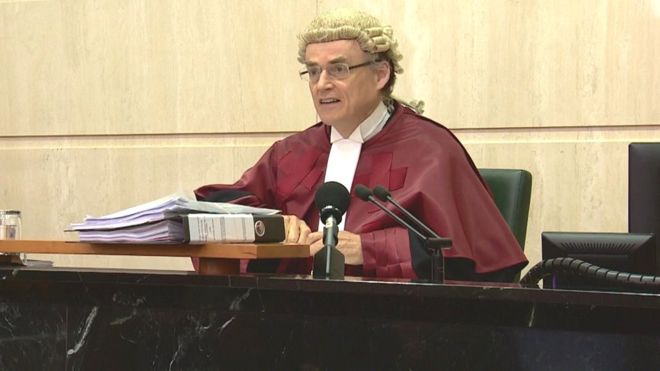A Scottish judge has refused to order a temporary halt to Boris Johnson’s plan to shut down the UK Parliament.
A group of 75 parliamentarians were seeking an interim interdict – similar to an injunction – at the Court of Session ahead of a full hearing.
Their request was declined by Lord Doherty, who said he was not satisfied there was a “cogent need” for an interdict.
However, the full hearing will now be heard next Tuesday, rather than Friday.
Lord Doherty said this was because it was in the interests of justice, and in the public interest, for the case – which is opposed by the UK government – to proceed as quickly as possible.
But he said: “I am not satisfied that it as been demonstrated that there is a need for an interim suspension or an interim interdict to be granted at this stage.”
The judge will not decide on the merits of the case until he has heard legal arguments from both sides on Tuesday, with his final ruling potentially being delivered the following day.
His decision not to grant an interdict was largely because the first possible date that Parliament can be suspended is not until next Friday.
The prime minister wants to suspend Parliament – a process known as proroguing – for several weeks ahead of a Queen’s Speech on 14 October. The UK is due to leave the EU on 31 October.
The cross-party group of politicians involved in the case, including SNP MP Joanna Cherry and Liberal Democrat leader Jo Swinson, wants the court to rule that it would be illegal and unconstitutional for him to do so.
Their QC, Aidan O’Neill, said the prime minister should lodge a signed affidavit – a sworn statement on oath – with the court setting out his reasons for wanting to prorogue parliament.
But the UK government argues that the decision to prorogue Parliament is one for the Queen alone, based on the government’s advice, rather than the courts or MPs.
Responding to Friday’s ruling, a UK government spokesman said: “As we have set out, the government needs to bring forward a strong domestic legislative agenda and MPs are not prevented from scrutinising our withdrawal from the EU.
“We are glad the court found against the interdict – there was no good reason to seek one, given the full hearing is due to take place next week, and the process of bringing the session to an end will not start until the week commencing 9 September.”
The Court of Session hearing came as former prime minister Sir John Major announced he was joining forces with campaigner Gina Miller to oppose the decision to suspend Parliament in the courts.
Ms Miller had already launched her own attempt, and Sir John said by joining her he would avoid “taking up the court’s time” by lodging a separate case of his own.
Source: BBC
